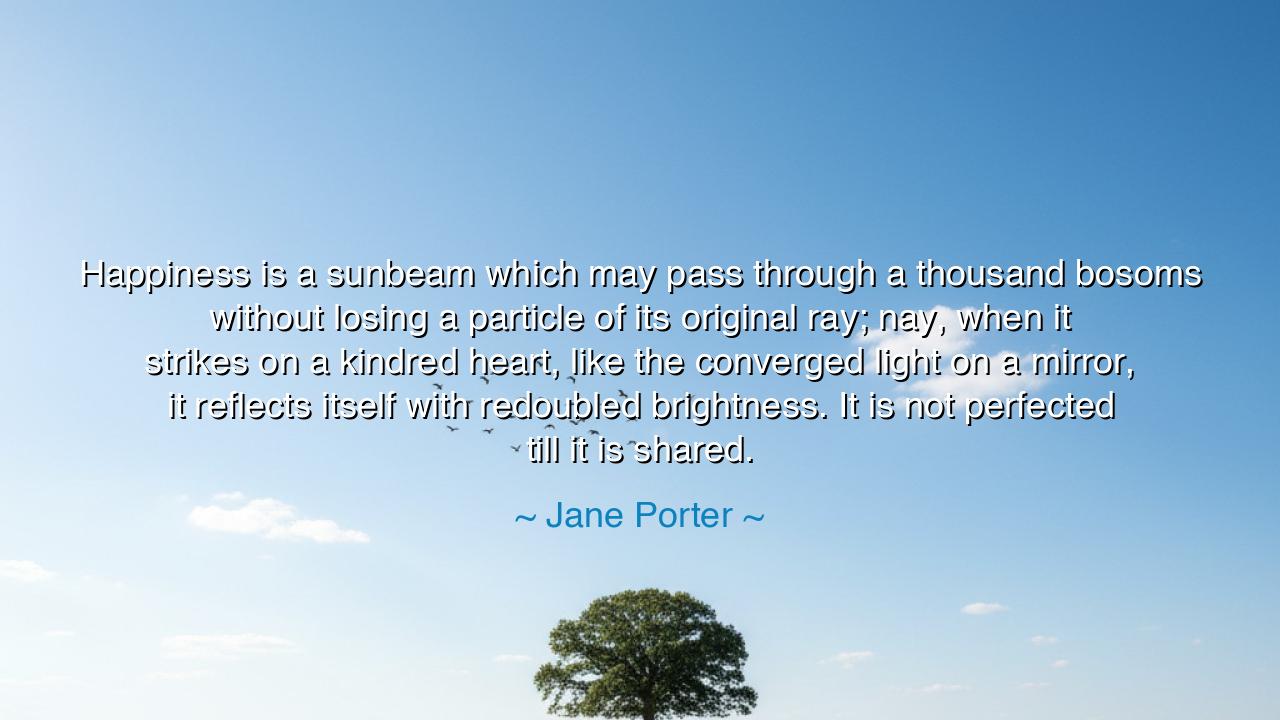
Happiness is a sunbeam which may pass through a thousand bosoms
Happiness is a sunbeam which may pass through a thousand bosoms without losing a particle of its original ray; nay, when it strikes on a kindred heart, like the converged light on a mirror, it reflects itself with redoubled brightness. It is not perfected till it is shared.






The novelist and poet Jane Porter, whose words glowed with the warmth of romantic idealism and moral truth, once wrote: “Happiness is a sunbeam which may pass through a thousand bosoms without losing a particle of its original ray; nay, when it strikes on a kindred heart, like the converged light on a mirror, it reflects itself with redoubled brightness. It is not perfected till it is shared.” In these lines, she captures one of the deepest mysteries of human existence—that happiness, unlike material wealth, does not diminish when given away. It multiplies. It shines more brilliantly the more it is shared, for joy is the one possession that grows only in generosity.
Porter lived during the early 19th century, an age of great emotional refinement and moral reflection. Her works—particularly The Scottish Chiefs—spoke of honor, courage, and the nobility of the human heart. From this inner vision arose her metaphor of happiness as a sunbeam, pure and radiant, moving freely through all souls. Like sunlight, it asks nothing and gives everything. It cannot be hoarded, for it belongs to the nature of light to shine outward. And when that light meets another heart that understands and reciprocates it, the joy does not merely remain—it doubles, like light striking a mirror and returning brighter than before.
To say that happiness is not perfected till it is shared is to remind us that true joy is not solitary. A man who locks his happiness within himself becomes like a candle placed under a bowl—its flame weakens and dies for lack of air. But the one who allows his joy to warm others finds it reborn in their gratitude, their laughter, their love. Such is the divine cycle of joy: to give is to receive; to share is to live more fully. Porter’s imagery of light passing “through a thousand bosoms” speaks of the immortality of kindness—how a single act of goodness, a single smile or word of encouragement, can ripple through generations, carrying forward the same original light.
Consider the example of Florence Nightingale, the Lady with the Lamp. Amid the blood and horror of the Crimean War, she walked through the darkened wards of the wounded, her lamp glowing in her hand, her face calm and tender. That small flame became a symbol of mercy to the suffering soldiers, who said her very presence gave them strength. Nightingale did not hoard her happiness; she shared it through compassion and courage. Her light—like the sunbeam of Porter’s words—passed through countless hearts, inspiring not only healing in her time but generations of nurses and caregivers to come. Her happiness, born of service, did not fade—it expanded, reflecting endlessly from heart to heart.
Porter’s vision also carries a subtle warning: that those who live for themselves alone will never know the fullness of joy. Selfish happiness is but a shadow of the true kind, fleeting and cold. The heart that loves only its own comfort is like a cloud that blocks the sun, keeping its own warmth while casting the world in gloom. But the heart that gives freely—of its time, its care, its laughter—becomes a window through which divine light pours. Happiness, she teaches, is not a condition but a communion, not an object but an energy that flows between souls.
This teaching echoes the wisdom of the ancients. Buddha spoke of the “boundless radiance of loving-kindness,” and the philosopher Seneca wrote that the wise man finds joy only when he benefits others. Even the early Christians described joy as a fruit of the spirit, growing only in love. Across cultures and ages, the truth remains the same: happiness is never complete until it is shared. Jane Porter’s words simply express this eternal principle in the radiant language of her time—the poetry of the heart’s sunlight.
So, my children of light, remember this as you walk your days: seek not to possess happiness, but to pass it on. When life gives you joy, let it flow outward through your words and deeds. Speak kindly, act selflessly, forgive quickly, and love freely. When you share your happiness, you multiply it—not only in others but in yourself. For each kindred soul that receives your light becomes a mirror that reflects it back, brighter and purer. This is the alchemy of the spirit—the transformation of joy into radiance, of self into communion, of life into blessing.
And so, let your happiness be like Jane Porter’s sunbeam—constant, generous, and divine. Do not clutch it to your breast, for it was never meant to be owned. Let it pass through you, through many hearts, until the world itself glows with its brightness. For in the end, happiness perfected is not the happiness we keep—but the happiness we share, and the light we leave shining long after we are gone.






AAdministratorAdministrator
Welcome, honored guests. Please leave a comment, we will respond soon